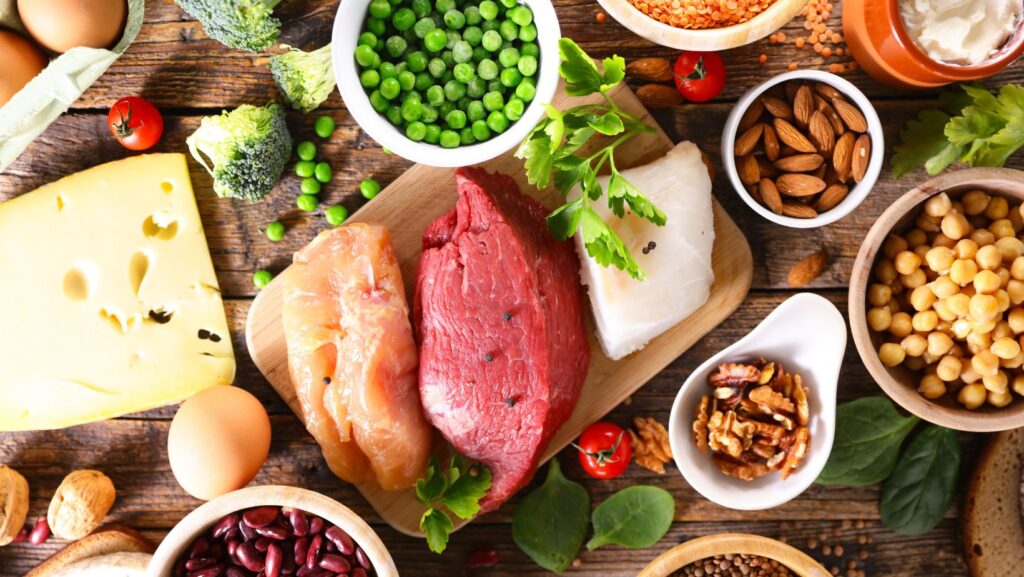Mindful eating is all about being present and aware during meals. Instead of rushing through breakfast, lunch, or dinner, it encourages us to fully engage with what we’re eating. This approach helps us appreciate flavors, textures, and the overall experience of eating.
The significance of mindful eating extends beyond mere enjoyment of food; it plays a crucial role in managing weight and enhancing digestion. When we focus on what we eat, we become more attuned to our body’s hunger and satiety cues. This awareness can lead to healthier food choices and better portion control, key components of maintaining a balanced diet.
Low-carb, high-protein foods are particularly beneficial within this framework. They provide essential nutrients while promoting a feeling of fullness, which can help curb overeating. Incorporating these foods into our mindful eating practice can improve our overall health, contribute to weight management, and promote better digestion.
Low-Carb, High-Protein Food Items
|
Food |
Serving Size |
Protein |
Carbs |
Fat |
Calories |
|
Chicken Breast |
3 oz (85g) |
25g |
0g |
3g |
130 |
|
Turkey Breast |
3 oz (85g) |
25g |
0g |
1g |
120 |
|
Salmon |
3 oz (85g) |
22g |
0g |
12g |
180 |
|
Tuna (canned in water) |
3 oz (85g) |
20g |
0g |
1g |
100 |
|
Egg (whole) |
1 large (50g) |
6g |
0.5g |
5g |
70 |
|
Greek Yogurt (unsweetened) |
1/2 cup (120g) |
10g |
4g |
4g |
100 |
|
Cottage Cheese (low-fat) |
1/2 cup (120g) |
14g |
4g |
2g |
90 |
|
Tofu (firm) |
3 oz (85g) |
8g |
2g |
5g |
80 |
|
Tempeh |
3 oz (85g) |
16g |
8g |
9g |
160 |
|
Almonds |
1 oz (28g) |
6g |
2g |
14g |
160 |
|
Chia Seeds |
1 oz (28g) |
4g |
12g |
9g |
140 |
|
Whey Protein Powder |
1 scoop (30g) |
20-25g |
2-4g |
1-2g |
100-120 |
|
Broccoli (cooked) |
1 cup (156g) |
4g |
6g |
0g |
55 |
|
Spinach (cooked) |
1 cup (180g) |
5g |
6g |
0g |
40 |
Practical Tips for Incorporating Low-Carb, High-Protein Foods into Mindful Eating
Incorporating low-carb, high-protein foods into your daily meals doesn’t have to be a challenge.

Here are some practical tips to help you embrace mindful eating while enjoying these nutritious options.
- Start by planning your meals ahead of time. Choose a day to prep your week’s meals. Cook proteins like chicken, turkey, or tofu in bulk, and portion them into containers for quick access. This strategy not only saves time but also ensures you have ready-to-eat meals that align with your dietary goals.
- When it comes to snacks, keep it simple. Opt for Greek yogurt, cottage cheese, or nuts. These snacks are rich in protein and can curb cravings without the extra carbs. I often mix in some berries for added flavor and nutrition.
- Mindful eating techniques are key to enhancing your experience. Focus on your food while eating; take smaller bites, and chew thoroughly. Put away distractions like your phone or television. This helps you to better appreciate the flavors and textures of your meals, turning eating into a more satisfying ritual.
- Lastly, consider incorporating a variety of low-carb vegetables into your dishes. They can add color, flavor, and nutrients while keeping the carb count low. Enjoy getting creative with your meals while maintaining mindfulness, and you’ll likely find yourself reaping significant health benefits.
Promoting Balanced Lifestyle
- Supports Muscle Growth & Repair: High-protein foods help in muscle building and recovery, crucial for maintaining strength and physical performance.
- Promotes Satiety: Protein is more filling than carbohydrates, helping control hunger and reduce overall calorie intake, which can aid in weight management.
- Stable Blood Sugar Levels: Low-carb foods prevent blood sugar spikes and crashes, helping to stabilize energy levels and reduce cravings.
- Improves Metabolism: Protein has a higher thermic effect (calories burned during digestion) compared to carbs or fats, supporting a more efficient metabolism.
- Enhances Fat Loss: A low-carb, high-protein diet encourages the body to burn fat for fuel, promoting fat loss while preserving lean muscle mass.
- Better Heart Health: Many high-protein, low-carb foods (like lean meats, fish, and legumes) are rich in heart-healthy nutrients like omega-3s and antioxidants.
- Increased Mental Clarity: Stable blood sugar levels can reduce brain fog and improve focus, contributing to better cognitive function.
- Sustainable Energy: Low-carb, high-protein meals provide a steady supply of energy without the rapid highs and crashes often associated with high-carb diets.
Embracing a Balanced Lifestyle through Mindful Eating
Mindful eating is a vital part of leading a balanced lifestyle. Throughout this blog, we explored how this approach not only enhances our relationship with food but also supports weight management and digestion.

Low-carb, high-protein foods play a significant role in this practice. They provide essential nutrients while promoting satiety and reducing cravings, making it easier to enjoy meals without overeating.
Incorporating these food choices can transform dining into a more intentional experience. It encourages you to savor each bite and pay attention to your body’s hunger signals. I’ve found that when I focus on the types of foods I consume and practice mindfulness, my overall well-being improves significantly. It helps me to feel more energized and mentally alert throughout the day.
As you consider adopting these practices, start small. Experiment with low-carb, high-protein foods in your meals and observe how they affect your eating habits and overall health. Remember, the goal is to create a sustainable, enjoyable way to nourish your body. By embracing mindful eating techniques, you are taking a significant step toward long-term health benefits that will serve you well. Let’s commit to this journey together for a balanced, healthier lifestyle.


